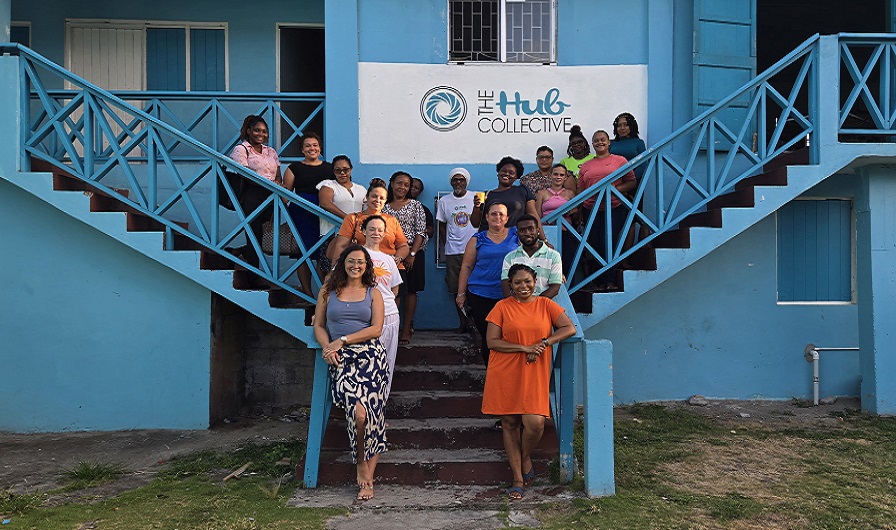Tackling Mental Health Needs in the Grenadines After Hurricane Beryl
When Hurricane Beryl tore through the Grenadines on July 1, 2024, it left more than shattered homes in its wake; it fractured the emotional backbone of islands like Union Island, Mayreau, Canouan and Bequia. With 90-100% of homes affected and thousands displaced, the physical devastation was matched by an equally harrowing emotional toll. The Healing Together initiative, a collaborative mental health response by The Hub Collective Inc. and MindTHRIVE Co., with support from Sol Relief, emerged to address the critical need for psychosocial support across the affected communities.
The Healing Together pilot program was rolled out on Mayreau, Union Island, and Bequia over four weeks between April and May 2025. Designed as a trauma-informed intervention, it sought to deliver culturally-responsive mental health care, build emotional resilience, and provide critical psychological first aid training to frontline workers and community members.
The need for such an intervention could not have been more acute, and according to the Caribbean Disaster Emergency Management Agency, vulnerable populations, including children, the elderly, persons with disabilities, women, and individuals with chronic illnesses, faced heightened psychological distress after the hurricane. Further compounding this crisis was the emotional burden carried by first responders, healthcare workers, and community leaders, many of whom were expected to support others despite their unresolved trauma.
The Healing Together workshops across the Grenadines saw a strong turnout, with 88% of the 66 registered participants attending and 83% identifying as women. Union Island recorded the highest attendance and counselling requests, while Bequia stood out for its active NGO presence. Though sectors like healthcare, law enforcement, and faith-based groups were underrepresented, their roles in crisis response highlight the need for broader engagement. Notably, 49% of participants requested one-on-one support; 23 completed intake sessions, with 19 continuing care. These figures underscore an urgent demand for accessible, trauma-informed mental health services across the Grenadines.
Psychosocial patterns emerging across the Grenadine islands reveal deep, diverse community needs. While each island’s experience is distinct, common themes include strained trust in support systems, lingering post-disaster trauma, housing insecurity, cultural stigma surrounding mental health, and the erosion of traditional support networks. These trends highlight an urgent call for safe, inclusive spaces, sustained psychosocial care, and culturally rooted approaches to healing and resilience-building.
Building on the pilot’s successes and insights, the Healing Together team recommends a multi-pronged strategy to expand and deepen its impact. Central to this approach is capacity building: empowering frontline workers, teachers, healthcare professionals, first responders, faith-based organisations, and NGO staff with culturally-relevant mental health training that emphasises trauma-informed care and early identification of psychological distress.
Equally important is the decentralisation of support, which is felt acutely across the Grenadines. Trusted community figures, faith leaders, elders, community leaders and volunteers should be further equipped with the tools and training to offer psychological first aid, emotional reassurance and support to refer people effectively. These individuals often serve as the first line of support in their communities and can play a transformative role in bridging the gap between formal and informal care.
Enhancing the visibility and communication of existing mental health services, ensuring they are accessible, trusted, and widely understood by the public, is essential to reducing stigma and raising awareness. Strengthening referral networks and increasing the frequency of mobile mental health visits, especially to under-resourced islands like Mayreau and Union, can ensure that no community is left behind. In Bequia, where challenges around family dynamics and household structures were highlighted, family therapy models that reflect the local cultural context could prove especially impactful.
A key recommendation from recent findings is the formation of a Grenadines Mental Health Task Force, an inter-island body comprising youth groups, NGOs, healthcare providers, and community leaders. This task force would advise and monitor efforts to ensure mental health is central to disaster response and community development planning. Creating tailored support groups and facilitating community dialogues is also vital in light of recurring emotional themes. These safe spaces will promote healing and strengthen social cohesion across the islands.
In parallel, educational outreach must be significantly expanded. Existing, culturally relevant mental health toolkits should be disseminated through schools, churches, clinics, and community centres. These plural-format resources promote emotional resilience and self-care among youth and underserved populations.
Healing Together has demonstrated that community-based psychosocial care is both urgent and essential. Similar needs have emerged across the Grenadines, particularly in Canouan, where first responders and residents continue to face trauma and displacement in the aftermath of Hurricane Beryl. The second phase of the Healing Together program aims to expand services to the island, ensuring broader access to essential mental health care and support systems.
With strategic investment, the initiative can scale across the Grenadines. The Hub Collective and MindTHRIVE Co. remain committed to this vision and actively seek partnerships and funding to ensure no one is left to heal alone.





